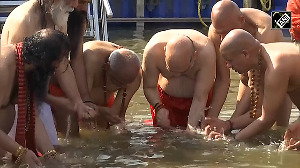As management gurus and Indian Inc speak volumes about how to run businesses in today's world of cutthroat competition, an entirely different business model evolved by the Tatas is making global impact from the hills of Munnar in Kerala.
Last year, Tata Tea Ltd, one of the largest integrated tea companies in the world, transferred its 17 tea estates spread across Munnar to a separate company called Kannan Devan Hills Plantation Ltd.
Tata Tea now has only a minority stake -- 19 percent -- in Kannan Devan Hills Plantation Ltd. The nearly 13,500 workers of the tea company hold the remaining shares, under a trust.
So last week, when KDHPL called for the annual general body meeting, it was the first of its kind, perhaps, in the world.
Thousands of workers gathered at the football ground of the Silent Valley tea plantation, one of the 17 tea estates in Munnar, in a temporary shelter specially made for the first AGM.
Every worker was in a cheerful mood, as Chellappan, a factory employee, pointed out. "It is our company's meeting. It is for the first time that we are attending an AGM. So it is time for us to celebrate," he says.
Like Chellappan, hundreds of workers turned up to listen to the speeches at the AGM made by their own members. Most of them were keen because the AGM would decide their new pay scales, the bonus and other benefits of annual revisions.
One of the board members of KDHPL is the 37-year-old A Chandra. Chandra is a woman worker who plucks tealeaves. As she rises to speak, everyone cheers and applauds. She says she has been inducted as one of the board of directors because "I have been working hard and performing my job well. Let us all work hard and make our company a great name."
So how good has been Chandra's performance?
Well, in the last 10 years, Chandra has won the best tea plucker's award from the Tata Tea in Munnar. Last year, she set a record by plucking 216 kg of tea leaves a day, as against 192 kg earlier. She earns only Rs 83 per day for her hard job. But she is happy and contended with life.
"The very feeling that I am working for my own company give me satisfaction. It makes all of us happy," she adds.
Chandra is today on the board of the Rs 110-crore (Rs 1.10 billion) KDHPL because it is no longer owned and administered by the Tatas, and because it is owned by the employees of the tea estates themselves.
Last year, along with the estates, Tata Tea's R&D wing at Munnar, the processing unit, and other physical assets were also being transferred to KDHPL. The Tatas, however, continue to manage the Tata School, a hospital and a centre for the mentally challenged people in Munnar.
KDHPL has a 100 per cent export-oriented unit manufacturing Instant Tea in Munnar, which is the largest such facility outside the United States.
The unit's product made from tealeaf extract using a unique process that is developed in-house has a distinctive liquoring and taste. Instant Tea is used for light density 100 percent teas, iced tea mixes and in the preparation of ready-to-drink (RTD) beverages.
T V Alexander, managing director, KDHPL, says that although the Tatas have given management control to the workers in Munnar, the core focus of the company has not changed.
"In fact, the company is working very well with the new management. The employees' participatory management system has given a unique opportunity to all the stakeholders to be part of the team that shapes the destiny of this company," he adds.
Workers as managers
But how does a large tea company with 17 estates operate under a workers' management control? Alexander explains that a proper workers' co-operative management system has been put in place to ensure that KDHPL grows like any other global tea company.
"This is the first and only branded tea company in the world owned and run by the workers. Our management model is unique and exciting," he exclaims.
Here is how the workers run the Kannan Devan tea company:
- Unlike other global companies that have a top-to-bottom hierarchical approach, Kannan Devan has a bottom-up management team.
- The base administrative unit in the company is a division in an estate that comprises 100 acres of plantations. A divisional administrative committee manages the day-to-day administrative functions of this core unit. The committee has a predominant representation from the workers -- two women and two men -- who are elected.
- An assistant manager is the convener of the committee, which has a field officer, an assistant field officer and an elected supervisor.
- The committee meets once a week, reviews the performance of the previous week, chalks out plans for the week ahead, and reviews the performance parameters.
- The next is the estate consultative council that consists of workers who have been elected from the divisional committees, representative from the supervisors, representative from the assistant field officer, the field officer and medical representative. The manager of an estate is the council's convener. The council meets once a month.
- The council is in-charge of an estate that has, generally, 6 to 7 divisions. The council chalks out the budget and the work plan of each estate.
- The council reports to the central management committee, convened by the managing director. The committee consists of wholetime directors, workers' representatives on the director board, staff representatives on the board and heads of key departments such as sales, production, human resources, et cetera.
The company continues to produce tea as its core business area. But the workers' management does not want just to produce tealeaves alone. Kannan Devan is now planning to diversify into horticulture, floriculture, and rearing of medicinal and aromatic plants.
A team of farming businessmen from the Netherlands recently visited the tea plantations, and evinced keen interest in setting up a floriculture project to grow roses in the upper regions of Munnar.






 © 2025
© 2025